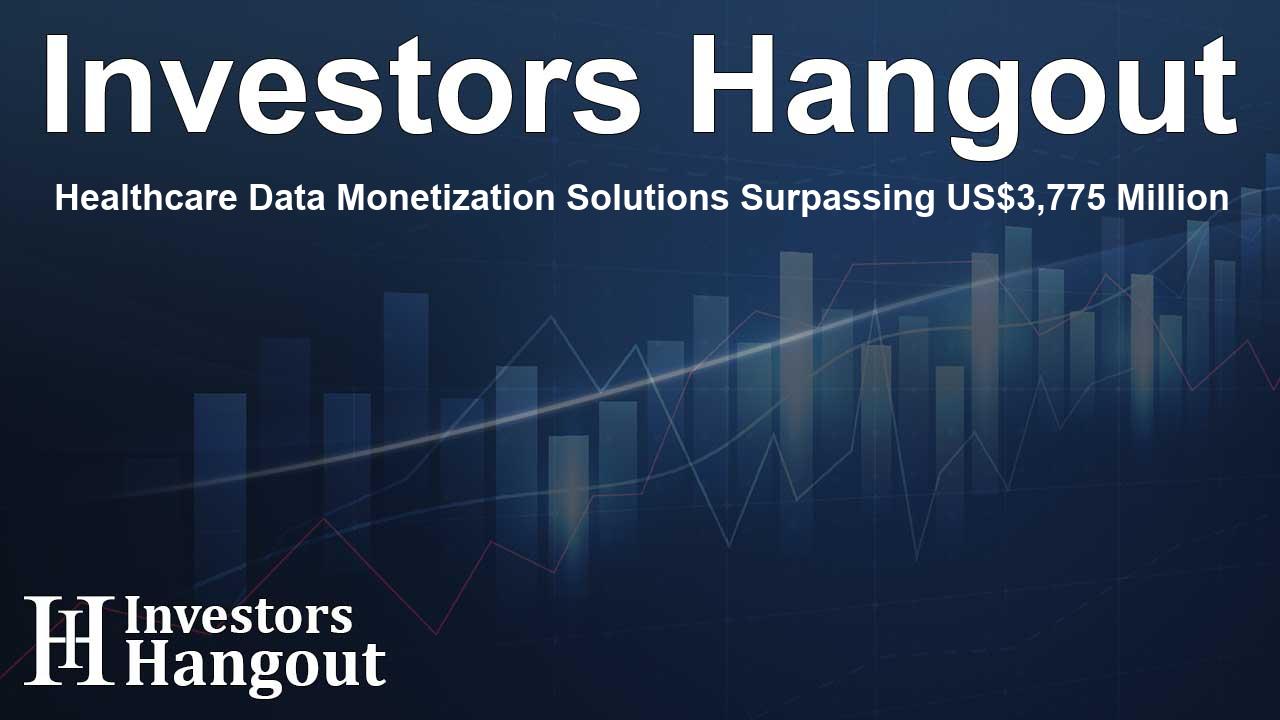Healthcare Data Monetization Solutions Surpassing US$3,775 Million

Healthcare Data Monetization Solutions Market Overview
The healthcare data monetization solutions market represents a significant evolution in how healthcare entities utilize the vast amounts of data generated daily. With a valuation of approximately US$865.64 million recently, this market is poised to grow dramatically, expecting to reach US$3,775.85 million within years. Such astonishing growth reflects a CAGR of 18.30% from current levels into the next decade.
Data: The New Asset for Healthcare
At the heart of this market growth are the enormous volumes of healthcare data being produced every day. As healthcare systems rapidly embrace digital transformation, data generation is set to hit staggering levels. Upcoming forecasts predict that by the end of the decade, data storage in the healthcare sector might reach around 10,000 exabytes, underlining the innovative monetization frameworks required to effectively capitalize on this data.
Innovative Solutions for Healthcare Providers
Healthcare providers are beginning to recognize the true value of their data, particularly patient records, which often remain underutilized. On average, large hospital networks have a wealth of over 100 million patient records that can be optimally transformed into actionable insights. Moreover, the increasing adoption of wearable health devices projected to surpass 1 billion adds an additional layer of complexity to data collection and monetization.
Challenges and Opportunities
Despite the wealth of opportunities within this domain, significant challenges persist. Industry-wide: the average cost of a healthcare data breach hovers around US$10.93 million, with hundreds of security breaches reported annually. Though robust solutions are emerging that harness technologies such as artificial intelligence, blockchain, and advanced analytics tools, addressing these cybersecurity concerns and ensuring compliance with regulations remains crucial.
Key Drivers of the Market
Several drivers contribute to the robust market momentum. Collaborations among healthcare providers, technology companies, and big data specialists are yielding innovative pathways for data utilization. The demand for personalized healthcare solutions fuelled by real-time health analytics is driving investment in interoperability and sophisticated data analytics, creating dynamic advancements in the healthcare landscape.
Application of Data in Healthcare Settings
Numerous application areas benefit from healthcare data monetization solutions. From predictive analytics in disease management to enhancing clinical research, the demand for data-driven results continues to rise. Departments such as orthopedics, oncology, and neurology significantly benefit from advanced visualization techniques powered by AI and machine learning, further driving innovation in patient care.
Insights into Global Trends
Global trends are shifting towards decentralized analytics networks that enhance population health monitoring, aiming for seamless data sharing across clinical and research environments. The rise of precision medicine, as well as the integration of blockchain for transparent data exchange, strengthens the foundation upon which future advancements are based.
The Future of Data Monetization
Looking ahead, healthcare providers will likely transition to more comprehensive models that promote data engagement from patient entry all the way to post-treatment follow-ups. As organizations strive for enhanced security with advanced technologies, including encryption and compliance management, the focus will shift to finding innovative solutions that can leverage the vast data landscape while ensuring privacy and security compliance.
Frequently Asked Questions
What is the expected growth rate of the healthcare data monetization market?
The market is expected to grow at a CAGR of 18.30%, reaching approximately US$3,775.85 million by the end of the forecast period.
How does data monetization affect healthcare providers?
Data monetization allows healthcare providers to transform underutilized patient data into actionable insights, improving service delivery and operational efficiency.
What technologies are driving this market?
Innovative technologies such as artificial intelligence, blockchain, machine learning, and advanced analytics play a pivotal role in driving healthcare data monetization.
What are the potential security implications?
Given the sensitivity of patient data, healthcare institutions face significant security concerns, with potential breaches costing up to US$10.93 million on average.
What future trends should we expect?
Future trends include the integration of precision medicine, advanced analytics, and decentralized platforms to enhance data utilization and research advancements.
About The Author
Contact Thomas Cooper privately here. Or send an email with ATTN: Thomas Cooper as the subject to contact@investorshangout.com.
About Investors Hangout
Investors Hangout is a leading online stock forum for financial discussion and learning, offering a wide range of free tools and resources. It draws in traders of all levels, who exchange market knowledge, investigate trading tactics, and keep an eye on industry developments in real time. Featuring financial articles, stock message boards, quotes, charts, company profiles, and live news updates. Through cooperative learning and a wealth of informational resources, it helps users from novices creating their first portfolios to experts honing their techniques. Join Investors Hangout today: https://investorshangout.com/
The content of this article is based on factual, publicly available information and does not represent legal, financial, or investment advice. Investors Hangout does not offer financial advice, and the author is not a licensed financial advisor. Consult a qualified advisor before making any financial or investment decisions based on this article. This article should not be considered advice to purchase, sell, or hold any securities or other investments. If any of the material provided here is inaccurate, please contact us for corrections.
